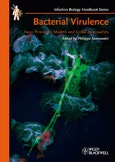Starting with basic principles, this reference and handbook discusses examples of the most advanced models of bacterial infection with regard to their value as paradigms to understand the molecular cross-talks between microbes and their host and tissue targets. It adopts a very forward-looking, advanced approach, placing special emphasis on the main global challenges facing scientists today, such as pathogenicity vs. commensalisms, infections in immunocompromised hosts and species specificity issues.
Table of Contents
BASIC PRINCIPLESHow bacterial pathogens got constructed (Dobrindt and Hacker)
Antimicrobial mechanisms of neutrophils (Zychlinsky, Chaput)
Helicobacter pylori: the way from inflammation to cancer (Chiba, Marusawa, Seno and Watanabe)
MODELS
Host-pathogen relationship in skin and soft tissue infections caused by Group A streptococcus and Staphylococcus aureus (Mishalian, Ravins, Baruch, Persky, Belotserkovsky and Hanski)
Mechanisms of meningeal invasion by septicemic extra cellular pathogens: the examples of Neisseria meningitidis, Streptococcus agalactiae and Escherichia coli (Join-Lambert, Carbonnelle, Chretien, Bourdoulous, Bonacorsi, Poyart and Nassif)
Two important bacterial pathogens causing community acquired pneumonia: Streptococcus pneumoniae and Legionella pneumophila (Buchrieser and Henriques-Normark)
The Salmonella-mouse interaction: a versatile model to study bacterial infection (Thompson, Helaine and Holden)
Chlamydia: from molecular insight to therapeutic discovery (Ogilvie, Heuer and Meyer)GLOBAL APPROACHES OF BACTERIAL VIRULENCE
The gut microbiota and its contribution to homeostasis (Schnupf and Sansonetti)
Anatomy of the gut barrier and establishment of intestinal homeostasis (Sellge, Schnupf and Sansonetti)
Dynamic imaging technologies to explore infectious processes at the cellular, tissue and organ level (Enninga, Tournebize, Melican and Richter-Dahlfors)
The issue of species specificity of bacterial infection, how to address it experimentally (Disson, Cossart, Lecuit)








